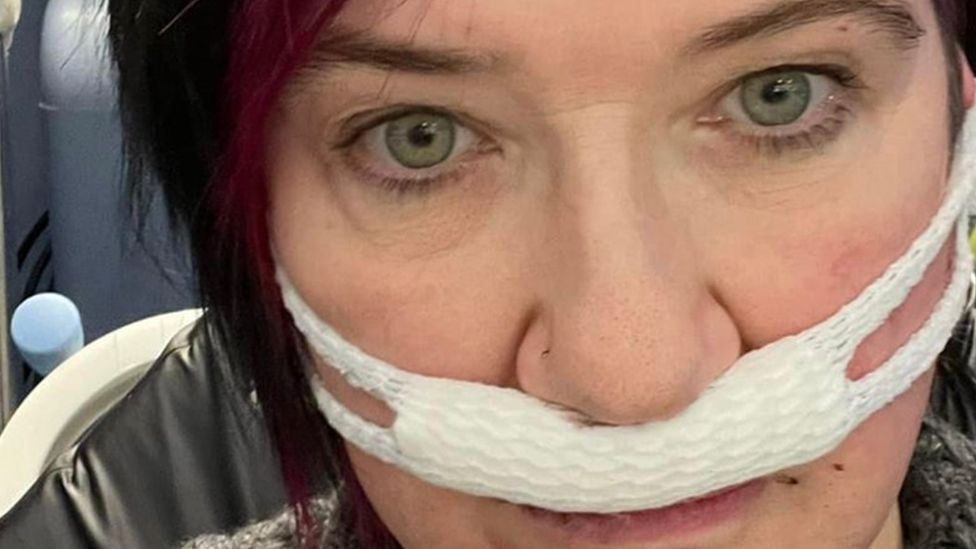ARTICLE AD BOX
 Image source, Sharon Gregg
Image source, Sharon Gregg
By Marie-Louise Connolly
BBC News NI health correspondent
A County Antrim woman who bleeds every day from her nose, eyes, or fingernails has called for greater understanding of her rare genetic bleeding disorder.
Sharon Gregg can lose up to two pints of blood during one nosebleed, which she said can happen several times a day.
Speaking to BBC News NI, the 53-year-old said the volume of blood was "shocking and frightening", especially if she is at home alone.
This article contains descriptions some readers may find disturbing.
Sharon said there needed to be a better understanding of Hereditary Haemorrhagic Telangiectasia (HHT), especially among GPs, to better allow them to diagnose the disorder in children.
About 100 people in Northern Ireland have been officially diagnosed with HHT, which affects the blood vessels.
'Catastrophic' for patients
Dr Gary Benson, a consultant haematologist who has a special interest in bleeding disorders, said HHT can be catastrophic for the patient.
He said while 90% will have nose bleeds, it is a condition which can affect every part of the body, including the brain, gut, lungs, and liver.
Image source, Sharon Gregg
Image caption,Sharon bleeds from her nose, fingernails, eyes, tongue
Dr Benson also said that the 100 people officially diagnosed with this disorder in Northern Ireland were "a drop in the ocean" and there were likely more people unaware they had HHT.
Officially it is thought that one in 5,000 people are born with HHT.
'So unpredictable'
Dr Benson described the condition as horrendous - especially for teenagers.
He recalled treating a sixth form student who bled over an exam paper during their A-Levels.
"It is so unpredictable, it doesn't matter what a patient is doing, it will happen when you least expect it, and your body decides to just bleed," he said.
Dr Benson said that while a nosebleed by itself was not a sign of the disorder, one that lasted for two hours should not be treated as normal.
"Families, however, who have seen relatives bleed all their lives, have normalised the disease - which they shouldn't.
"This is far from normal which you have seen in Sharon's case - Sharon can fill jugs with blood at one time and that is not normal.
"While rare this can be serious, especially bleeds on the brain which can become a very real complication," Dr Benson said.
Hereditary condition
Sharon said the condition meant she was mostly confined to the house and avoided family occasions as she never knows when the bleeding will start, nor how long it will last.
Sharon Gregg's father and grandfather also lived with the hereditary condition
The condition also affects her internal organs - including her lungs and brain.
She has been hospitalised several times.
HHT is hereditary and, according to Sharon, her father and grandfather also lived with it.
"I am speaking out to find more people. I know there are more people out there who have the same family story as me.
"My dad's health problems, including strokes and gastric bleeding, were linked to the bleeding," she said.
A large medical bag sits in the family kitchen which is brimming with bandages, plasters and pressure dressings.
When her fingers bleed, Sharon sometimes has to go to hospital as she said she cannot physically cope with applying the dressings.
A clamp is also in the medical bag to stop the bleeding from her tongue.
What is HHT?
People with HHT have some abnormal blood vessels that have not developed properly and sometimes cause bleeding known as arteriovenous malformations (AVMs).
When AVMs form in the lining of the nose, the gut or skin, they can easily bleed without any warning.
Bleeds can last an hour or longer. Frequent bleeding can lead to iron-deficiency, anaemia, and stroke.
Typical symptoms include regular nosebleeds and red spots on certain parts of the body.
Symptoms usually start in childhood or in teenage years.
According to Dr Benson, parents of children who have nose bleeds which last more than half an hour should seek help.
Consultant haematologist Dr Gary Benson said some patients may be unaware that they have HHT
Additionally, he said that children who have had to have their nose cauterised more than once can be an indication of HHT.
There is no cure for the condition and treatment is limited.
The blood vessel can be closed but according to Dr Benson the nature of the condition means the blood will just find another opening to flow through.
However, an iron deficiency can be treated through diet and iron supplements.
'Particularly difficult for women'
Some of Dr Benson's female patients who have their monthly period find the condition particularly debilitating when they are also coping with bleeds elsewhere in the body.
He said those patients often struggled as their body needed additional iron - some four times more than a male patient.
"During my training it was likened to trying to fill a bath with the plug out and it's impossible to try and fill the body with additional iron to maintain the status quo."
He has called for more research and treatment into the rare disease.

 1 year ago
60
1 year ago
60








 English (US) ·
English (US) ·